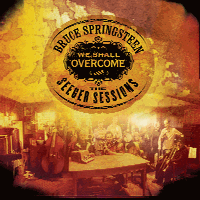 Bruce Springsteen just released a new album entitled "We Shall Overcome: The Seeger Sessions." It is his contemporary interpretation of the folk and protest music popularized by the likes of Pete Seeger in the 1950's and 1960's. It's a good listen, although apparently some Springsteen fans think it's too much of a departure from his foundation in rock music.
Bruce Springsteen just released a new album entitled "We Shall Overcome: The Seeger Sessions." It is his contemporary interpretation of the folk and protest music popularized by the likes of Pete Seeger in the 1950's and 1960's. It's a good listen, although apparently some Springsteen fans think it's too much of a departure from his foundation in rock music.
I'm certainly not one to comment with any authority on the musicology issues. But it has prompted in me some thoughts about the nature of protest. I enjoyed listening to his take on familiar tunes like O Mary Don't You Weep, Erie Canal, Pay Me My Money Down, and the haunting title song, We Shall Overcome. Springsteen's pounding rock style treats those songs with freshness even while honoring their folk roots.
But as I listened I was struck by a harsher more edgy tone than I had remembered from my college days in the late 1960's and early 1970's. Some of that comes from the musical interpretation, of course, but I think it goes deeper. The protest music of the civil rights movement and the opposition to the Vietnam War carried with it a broader vision of a new world in the making. I'm not sure I see that in our society any more. As a result, the music seems to carry a more cynical, less hopeful tone. It sings about what is wrong without offering a clear vision of what can be.
Martin Luther King lifted his voice and proclaimed, "I have a dream." When he did so he painted with poetry and prose an image of a world that lived out the values of equality, justice, and peace. The often ridiculed "flower children" of Woodstock and the street protesters of Chicago carried a flawed but still empowering vision of a better world. It had its excesses, to be sure, but it marshalled tens of thousand of people to step out of the status quo and put their bodies on the line for changes that they could "imagine," in the beautiful lyrics of John Lennon.
We need a dream to replace the cynicism that is so prevalent today. We need political and spiritual leaders who can paint a vision of a world that values all persons, that honors our diversity, and that empowers us to sing of "peace on earth" with conviction and hope.
In Proverbs 29:18 we read, "Where there is no vision the people perish." That is just what is needed in the public square these days. I'm happy to see contemporary singers paying tribute to the culture-changing music of the 1960's. What we need now, however, is not nostalgia for another time. Instead we need politicians, preachers, poets, and singers who can paint a 21st century vision that renews hope in human hearts and compels passion for constructive and meaningful change.
Technorati Tags: music protest hope
No comments:
Post a Comment